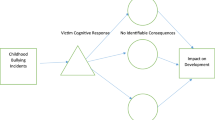Abstract
While the literature supports the view that a parent's illness will have an impact on a child, less specific attention has been given to the impact of a mother's breast cancer on her adolescent daughter. In this paper, clinical vignettes derived from interviews with adolescent daughters (ages 12–19) living with mothers who have breast cancer are presented to illustrate some of the concerns daughters have about themselves and their mother's illness. The daughters express anxiety about changes in family roles, but seem more concerned about the potential loss of the mother/daughter relationship. They describe their fears of recurrence of the disease as well as getting the disease themselves. The girls also demonstrate great strength; resilience and hope in the face of the challenges presented by the changes in their lives. Girls who had mothers die of the disease are not included in this article. Implications for treatment are discussed.
Similar content being viewed by others
REFERENCES
American Cancer Society. (1996). Cancer Facts and Figures.
American Cancer Society. (1997). Update.
Anthony, J. and Benedek, T. (ed.) (1970). Parenthood: Its Psychology and Psychopathology. Boston: Little Brown and Co.
Armsden, G. and Lewis, F. (1994). Behavioral adjustment and self esteem of school age children of women with breast cancer. Oncology Nursing Forum 21(1): 39-45.
Breast cancer screening for women ages 40-49. NIH consensus statement. Vol 15: No 1. Bethesda, MD: Office of Medical Applications of Research, 1997:1:35.
Compas, B., Worsham, N., Epping-Jordan, J., Grant, K., Mireault, G., Howell, D., and Malcarne, V. (1994). When mom or dad has cancer: Markers of psychological distress in cancer patients, spouses and children. Health Psychology, 13(6): 507-515.
Dickens, B.H., Pei, N., and Taylor, K.M. (1996). Legal and ethical issues in genetic counseling for susceptibility to breast, ovarian and colon cancer. CMA 154(6) 813-818.
Elson, M. (1986). Self Psychology in Clinical Social Work. New York and London: W. W. Norton and Company.
Gilligan, C., Rogers, A., and Tolman, D. (1991). Women, Girls and Psychotherapy: Reframing Resistance. New York: Haworth.
Haney, D. (1997). Breast cancer genes cause buildup of other genetic mutations. AP Worldstream. Dateline: San Diego, April 14.
Harpham-Schlessel, W. (1997). When a Parent has Cancer: A Guide for Caring for Your Children. New York: HarperCollins, Inc.
Hortobagyi, G. (1998). Treatment of breast cancer. The New England Journal of Medicine 339:974-984 (October 1), 1998.
Kenemore, E. and Spira, M. (1995). Mothers and their adolescent daughters:transitions and transformations. Journal of Child and Adolescent Social Work. 225-39.
Lamb, J. (1984). Adolescent girls responses to mother's breast cancer. Unpublished dissertation, University of Pittsburgh.
Lee-Jones, C., Humphris, G., Dixon, R., Hatcher, M. (1997). Psycho-Oncology 6(2):95-105, 1 June.
Lewis, F. and Hammond, M. (1992). Psychosocial adjustment of the family to breast cancer: A longitudinal study. Journal American Med Women's Association, 47(5), 194-200.
Lewis, F., Hammond, M., and Woods, N. (1993). The family's functioning with newly diagnosed breast cancer in the mother: the development of an explanatory model. Journal of Behavioral Medicine, 16(4):351-370.
Lichtman, R., Taylor, S., Wood, J. (1985). Relations with children after breast cancer: the mother daughter relationship at risk. Journal Psychosocial Oncology 2.
McGoldrick, M. and Carter, E. (1982). The family life cycle. In F. Walsh (ed.) Normal Family Process. New York: Guilford.
Northouse, L. (1995). The impact of cancer in women on the family. Cancer Practioner, 3(3): 134-142.
Oktay, J. and Walter, C.(1991). Breast Cancer in the Life Course: Women's Experiences. New York: Springer.
Palombo, J. (1988). Adolescent development: a view from self psychology. Child and Adolescent Social Work, 5(3).
Rait, D., Ostroff, J., Smith, K., Cella, D., Tan, C., and Lesko, L. (1992). Lives in a balance: perceived family functioning and the psychosocial adjustment of adolescent cancer survivors. Family Process, 31(4): 383-397.
Rich, A. (1976). Of Women Born: Motherhood as Experience and Institution. New York: W.W. Norton and Co.
Rolland, J. (1994). Families, Illness and Disability. New York: Basic Books.
Shapiro, D., Bogg, S., Rodrigue, J., Urry, H., Algina, J. Hellman, R., and Ewen, F. (1997, Aug.). Stage II breast cancer: Differences between four coping patterns in side effects during adjuvant chemotherapy. Journal of Psychosomatic Research 43(2):143-157.
Spiegel, D. (1997). Psychosocial aspects of breast cancer treatment. Seminars in Oncology 24 (1Suppl 1)SI-36-SI-47, 1997, Feb.
Taylor, B. (1994). The impact of didactic group experience on young women with a maternal history of breast cancer. Unpublished dissertation, University of Illinois.
Wellisch, D. (1981). Family relationship of the mastectomy patient: Interactions with the spouse and children. Israel Journal of Medical Science, 17:993.
Wellisch, D., Gritz, E., Schain, W. et al. (1991). Psychological functioning of daughters of breast cancer patients. Part I: Daughters and comparison subjects. Psychosomatic, 32: 324.
Wellisch, D., Gritz, E., Schain, W. et al. (1992). Psychological functioning of daughters of breast cancer patient. Part II: Characterizing the distressed daughter of the breast cancer patient. Psychosomatic, 33:171.
Author information
Authors and Affiliations
Rights and permissions
About this article
Cite this article
Spira, M., Kenemore, E. Adolescent Daughters of Mothers with Breast Cancer: Impact and Implications. Clinical Social Work Journal 28, 183–195 (2000). https://doi.org/10.1023/A:1005106301713
Issue Date:
DOI: https://doi.org/10.1023/A:1005106301713




